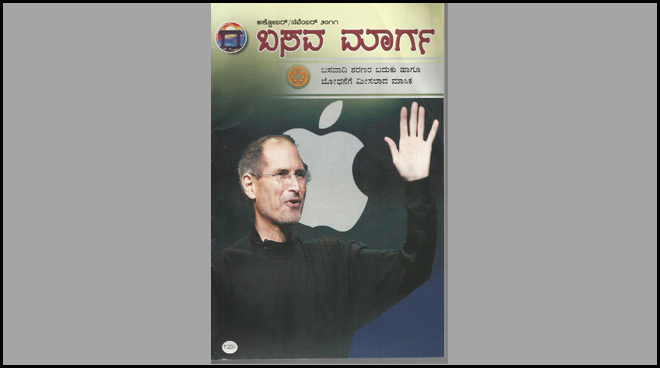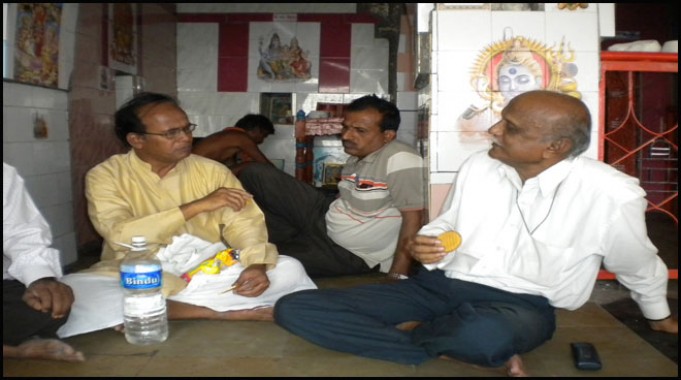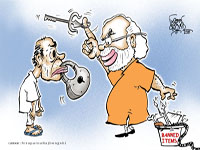Criticise Hindu nationalists at your peril
Prof Kalburgi and Linganna Satyampet (in yellow) in a discussion, Shahapur, 2010
Amid the murder of Karnataka rationalist Professor M. M. Kalburgi last month, the earlier death of anti-superstition crusader Narendra Dabholkar in Maharashtra in 2013 and sundry death threats meted out to journalists, an alarming trend can be discerned: those who attack Hindutva groups and their ideas can end up as targets of their hate campaigns and death threats.
The even earlier death, in 2012, of journalist Linganna Satyampet in Karnataka is still shrouded in mystery. His son, Vishwaradhya Satyampet, is haunted by the thought that Professor Kalburgi would have been alive today if the Karnataka police had investigated his father’s death more rigorously.
Linganna Satyampet, editor of Basavamarga, a monthly journal on religious issues and Agniankura, a fortnightly on political and social issues, was found dead in a canal barely 100 feet from the Chennabasaveshwar temple in Gulbarga on July 25.

Cover of last issue of Basavamarga, before Linganna Satyampet's death in July 2012.
Satyampet was a follower of Basava, the 12th century philosopher saint who is worshipped by the Lingayat community. He was scheduled to speak at a function but never reached the venue. His semi-clothed body was found the next day. Vishwaradhya says his father had received a number of threats over his articles but didn’t take them seriously enough to inform the police.
The police said that Satyampet had suffered a massive heart attack but this does not explain the manner in which his body was found only the next day so close to the temple he was scheduled to visit, nor the fact that he was found in his underwear.
The memory of Satyampet’s death had almost faded till the shooting of Kannada scholar and rationalist Professor Kalburgi on August 30. Professor Kalburgi had been Satyampet’s mentor and friend. Deeply disturbed by the two deaths, Vishwaradhya Satyampet is now demanding a proper investigation into his father’s death.
Sinister behaviour at a Maharashtra press conference
In Maharashtra, meanwhile, senior editor Nikhil Wagle and film maker Anand Patwardhan received death threats by leaders of the Hindutva organization, Sanatan Sanstha, at a press conference in Mumbai last week.
The secretive Sanatan Sanstha does not take kindly to anyone who questions its modus operandi. Its press conference was held to defend one of its members, Samir Gaikwad who was arrested in connection with the killing of CPI leader Govind Pansare in January this year. During the press conference Sanatan Sanstha leaders Abhay Vartak and Sanjiv Punelekar, denied that Gaikwad had been involved in Pansare’s death.
But they didn’t stop there. The group’s members took photographs of every journalist present and issued a veiled threat to Patwardhan who was filming the press conference. For the Sanatan Sanstha and other like-minded groups, people like Patwardhan are ‘hypocritical progressives’, as can be seen in the YouTube report on the press conference.
Later, Wagle tweeted that the Sanatan Sanstha had also threatened him. Last week, the police told him that they had intercepted phone conversations in which Wagle was mentioned as the ‘next target’. Wagle has been offered police protection but he has refused.
On September 11, Sanatan Prabhat, the official organ of the Sanatan Sanstha, published an article attacking Shyamsunder Sonar, a senior journalist with the Marathi daily ‘Prahaar’. Sonar is alsoa preacher of the varkaris, pilgrims who are part of the Bhakti movement and worship the Pandarpur deity, Vithoba, after he gave a speech in Latur on the need for rational thinking.
Possible targets in Karnataka
But it is in Karnataka where the threats and attacks seem to be the worst. Those who have beenmonitoring the rise of Hindutva forces in the state say that Linganna Satyampet was not the only one on the hit list. “The manner in which Satyampet died is still unexplained and mysterious but there are others on the list,” warns Lankesh Patrike editor Gauri Lankesh.
“We’ve made a list based on how many times the Hindutva groups spew venom on us and how strongly”, she says. First on the list is writer and rationalist K.S. Bhagwan, then writer Yogesh Master who has been attacked for his fictional work, and then another writer, Banjagere Jayaprakash.
Lankesh herself has been attacked for her views and she is fourth on the list. Others are CPM activist K. S. Nirmala and senior journalist and media advisor to the Karnataka Chief Minister, Dinesh Amin Mattu. The latter became a target on Facebook for his article on Swami Vivekananda a few years ago. Mattu filed a police complaint in January.
In Karnataka, attacks on rationalists have been steadily on the rise, says Lankesh. In April 2014, Sangh Parivar supporters smeared cowdung on Suresh Bhat Bakrabail, district president of Karnataka Komu Sauharda Vedike in Mangalore for opposing Narendra Modi’s candidature as prime minister.
In February, 2013, B. V. Sitaram, editor of Karavali Ale in Mangalore was arrested for criticizing the RSS and the Bajrang Dal. And television journalist Naveen Soorinje, out on bail after spending over four months in jail, is still facing charges for filming the Hindu Jagaran Vedike attack on a homestay in July 2012 where young men and women were celebrating a birthday.
The threats are coming thick and fast. The Karnataka Sahitya Academy received more than 20 threatening phone calls yesterday if it went ahead with its plan to give a Lifetime Achievement’s award to the rationalist and writer K.S. Bhagawan in 2013.
Last week, Bhagawan told a Kannada TV channel that he had received threats from Hindutva activists who oppose him for saying, among other things, that Hindus should not consider the Ramayana and Mahabharata as sacred texts as they do not uphold human values. He is under 24-hour police protection.
In another development, two prominent Kannada writers, Chennaveera Kanavi and Giraddi Govindaraja, withdrew their names from a memorandum signed by over 130 writers to demand a probe into the killing of Professor Kalburgi, ostensibly because the memorandum named the Sri Ram Sene as being involved in the killing.
When Linganna Satyampet died, the news did not have much impact because he was not so well-known and it happened in a small town, away from media attention. But now, with hindsight, argues Lankesh, it’s clear that the factors that led to his death need to be re-examined.
What is worrying about Karnataka, which has nurtured eminent rationalists such as Professor Hosur Narasimhaiah and Narendra Naik, is the spread of saffron sentiments. Lankesh says it is not just the administration and the police but also the media who are becoming increasingly saffronised.
She points to the manner in which the media reported the debate on the Anti-Superstition Bill. “The Sangh Parivar campaigned virulently against the Bill, falsely claiming that it would prohibit women from wearing the taali when it actually opposed human sacrifice and the exploitation of women”.
Meanwhile, Satyampet’s son, Vishwaradhya, is still seeking answers. “If they had investigated my father’s death seriously, Professor Kalburgi would have lived. The same forces have been behind the killings of both, I am sure of it,” he says.








